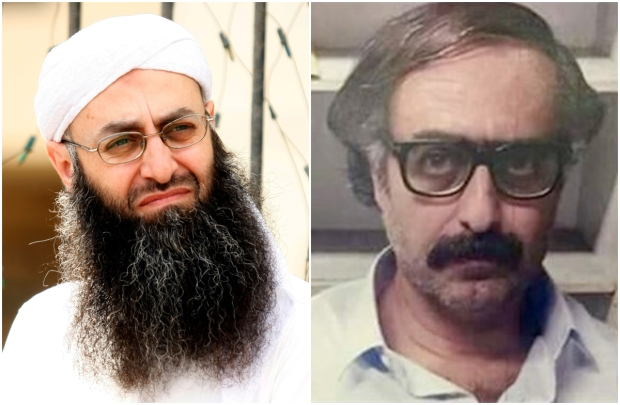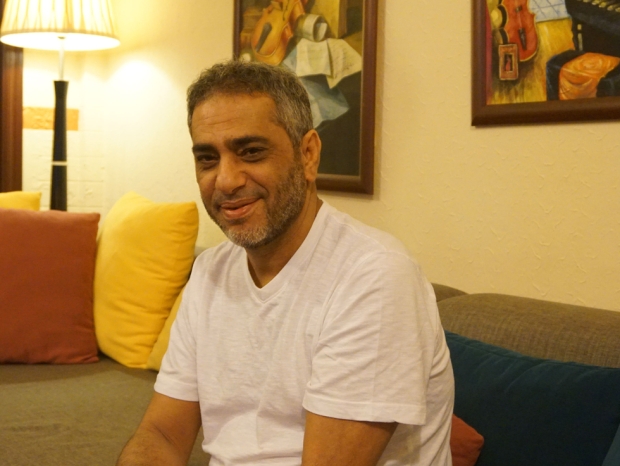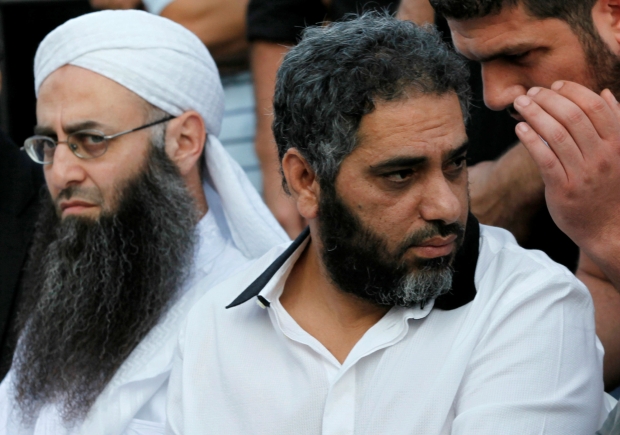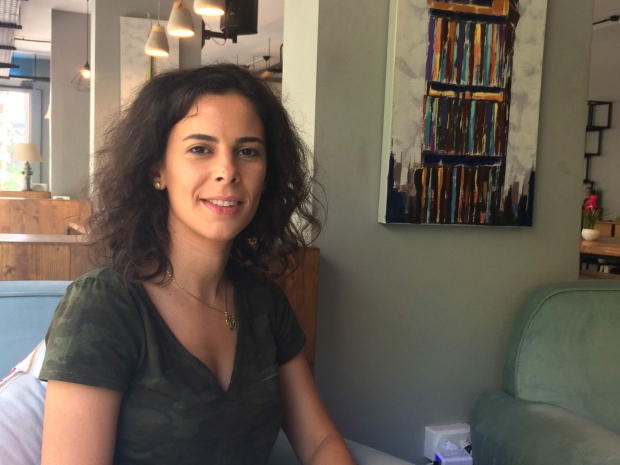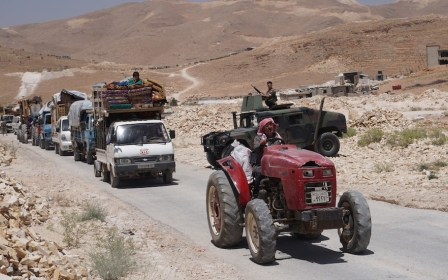'I'm an artist': Fadel Shaker, fugitive Lebanese popstar, plots his comeback

AIN AL-HILWEH, Lebanon - “I miss your eyes, ya habibi, don’t go far away, you are my destiny and the only one in my heart,” Fadel Shaker once sang in his catchy hit “Oh Absent One”.
When the song came out in 2006, Shaker was still the clean-shaven and baby-faced crooner whose love songs attracted thousands of fans at concerts across the region, from Tunis to Beirut.
Those days are long gone.
For the last five years, Shaker has been holed up in the Ain al-Hilweh Palestinian camp in an attempt to evade authorities over his role in 2013 clashes in south Lebanon’s Abra.
But the 49-year-old fugitive has never given up hope that he could one day make a musical comeback, and is now plotting his return to the limelight.
A shadow of the popstar he used to be, Shaker receives guests politely but reservedly in the second-floor apartment he’s lived in since 2013.
Speaking in a low voice, he complains of various physical ailments and of being the victim of a terrible misunderstanding.
Massacres, rapes… How could I just watch what was happening to the Sunni population of Syria and do nothing?
- Fadel Shaker
Last September, Shaker was sentenced in absentia to 15 years of hard labour by a Lebanese court for his involvement in the June 2013 clashes, which saw a group of Sunni militants take on the Lebanese army.
Nearly 60 people died in the fighting, including 18 soldiers. At the time, it was regarded as the worst spillover of the Syrian civil war into Lebanon.
The militants were led by charismatic Salafi preacher Ahmad al-Assir, who gained notoriety for criticising Syrian President Bashar al-Assad and Hezbollah, the powerful Lebanese Shia party that has supported him in Syria’s war since 2012.
Following the clashes, Assir disappeared, only to be caught in disguise attempting to flee the country through Beirut airport two years later. He was later sentenced to death for his role in the fighting.
He grew his beard, shaving the moustache Salafi-style, and would sing religious anthems at sit-ins organised by Assir.
“Massacres, rapes… How could I just watch what was happening to the Sunni population of Syria and do nothing?” asks the singer, sitting in his living room.
Life in the camp
Other than family visits once a week, a big flat-screen television and several surveillance cameras are now Shaker’s only distractions.
He sleeps much of the day, spending time in the evenings in his living room with loyal friends and collaborators, chain-smoking or ordering sushi for dinner from the nearby city of Saida.
Shaker dreams of experiencing again something close to the fame he once knew as a musician.
He’s even converted the third floor of the building he lives in into what he calls a studio, a small room with an electric piano pushed up against the wall, next to his landlord’s Kalashnikovs.
Masri has forbidden overtly political questions. She wants her client to be depicted in a more positive light than what has been published these past few years by the Lebanese press, which regularly describes him as a dangerous militant and a traitor to the country.
To meet Shaker, one must get a permit from the Lebanese army to enter Ain al-Hilweh, go through one of the four army checkpoints that serve as official entrances, before being escorted by one of his aides through the camp’s narrow, graffiti-laden streets.
Each neighbourhood of the squalid, overpopulated camp falls under the control of a different Palestinian faction, whose multiple attempts to coordinate security have failed in recent years.
'I’m an artist. I don’t know how to do anything else'
- Fadel Shaker
Unless under exceptional, often violent, circumstances, Lebanese state authorities have not entered Palestinian refugee camps since a 1969 agreement. As a result Ain al-Hilweh, the biggest camp in Lebanon, has become a haven for militant groups.
“It’s like a prison here, but at least I’m free,” shrugs Shaker, who is housed by a friend in an area controlled by hardline Sunni group Shabab al-Muslim.
He says that he does not venture further than the streets surrounding his flat out of fear for his life.
Shaker’s one-bedroom flat is of a higher standard than the average home in Ain al-Hilweh. But it’s a far cry from his luxurious $5m villa in neighbouring Saida, which was burnt to the ground shortly before the 2013 clashes.
“I know very well who did it,” says Shaker bitterly. His hatred for Hezbollah, which he never explicitly names throughout the interview, has remained intact.
Like his ex-mentor Assir – whom he swears he cut ties with by April 2013 - Shaker accuses Hezbollah of provoking the Abra clashes, though the Lebanese army denies the party was involved.
According to his version of events, Shaker was sleeping in an Abra apartment he was staying in following the arson attack on his villa.
Masri says it was pure coincidence he was in the Saida suburb when Assir and his gang began fighting the military.
A Lebanese military court acquitted Shaker of terrorist charges and of being responsible for the death of Lebanese soldiers.
However, he was found guilty of setting up an armed group, conducting an armed insurgency against the state, encouraging sectarian conflict and owning weapons without a proper licence.
“All a plot,” counters Shaker, who says that he wants to focus on his original career: music.
Gold in his voice
“I’m an artist. I don’t know how to do anything else,” says the singer, who has attempted several times to make a comeback in the music world since 2013.
Last May, Shaker tried again. Except that this time, it spectacularly backfired.
Contacted by an Egyptian production company, he was paid $40,000 – according to him - to sing the intro song for a TV series to be aired during Ramadan, when viewership shoots up across the Muslim world.
I just don’t understand why he adopted a radical discourse. He was one of the most famous Lebanese popstars and sang about love and happiness
- Sandy Tannous, sister of a slain soldier
However, this latest attempt at rehabilitation provoked outrage in Lebanon, especially among the families of soldiers killed in Abra. The song was quickly withdrawn from the show.
“Out of respect for Fadel Shaker, the production company left the song on YouTube, where it already had millions of views, and they replaced Shaker’s song with instrumental music in the series,” Bechara Maroun, a Lebanese entertainment journalist, tells MEE.
According to Maroun, who said he spoke to the CEO of the production company El Adl, Shaker kept the money and the show stayed on air.
Shaker’s original intro can be seen here:
“It was shocking for us,” says Sandy Tannous, a 30-year-old legal advisor at the Lebanese Parliament, sitting in a Beirut café.
Her brother Samir, 28 years old at the time, was the first soldier killed during the Abra clashes.
“How could we accept that someone who contributed to this battle goes back to a normal life when our life isn’t normal anymore?” she asks.
For Tannous, Shaker’s choice still remains a mystery.
“I just don’t understand why he adopted a radical discourse. He was one of the most famous Lebanese popstars and sang about love and happiness,” she says.
“I don’t think he fully grasped the consequences of his actions on his life at the time.”
“In the 2000s, Shaker was at the centre of Rotana’s best years,” remembers Maroun. “He had gold in his voice.”
At the time, Shaker was known to be “socially conservative”, notes Maroun.
“But he was a polite, shy artist who didn’t flaunt his fortune. That’s why the contrast between the pop star who sang love romances and this aggressive, weapon-dealing man was so huge.”
Particularly damning for Shaker’s reputation was an amateur video uploaded on YouTube during the clashes. Surrounded by three excited men, one of whom mentions “the fighting which took place yesterday”, Shaker says: “We killed two fatisa,” using the Arabic term for rotting animal flesh.
Tannous, in a view widely shared in Lebanon, is convinced that Shaker is referring to soldiers, and specifically her brother. “For him, soldiers weren’t even human beings.”
When asked about the video, Shaker and Masri claim it was filmed before the Abra clashes, without giving details on its exact date or what he was referring to.
In Lebanon, public opinion is divided: a large part doesn’t respect him anymore, but others miss Fadel Shaker as an artist
- Bechara Maroun, entertainment journalist
“In Lebanon, public opinion is divided: a large part doesn’t respect him anymore, but others miss Fadel Shaker as an artist,” says Maroun.
However, Maroun believes Shaker’s chances of returning to the music scene are slim.
“I don’t think he will ever be able to sing again in Lebanon or in Syria. If he gave himself into the army, it would improve his image, but I don’t think he’ll do it.”
Shaker may have better luck elsewhere.
“In Egypt, for example, they haven’t followed his story very well. For them, he’s an artist who had an exquisite voice and sang beautiful songs. They don’t understand why he doesn’t sing anymore,” Maroun says.
“That’s why an Egyptian production company thought of him last Ramadan: they just considered that the song suited his style.”
Stay informed with MEE's newsletters
Sign up to get the latest alerts, insights and analysis, starting with Turkey Unpacked
Middle East Eye delivers independent and unrivalled coverage and analysis of the Middle East, North Africa and beyond. To learn more about republishing this content and the associated fees, please fill out this form. More about MEE can be found here.


